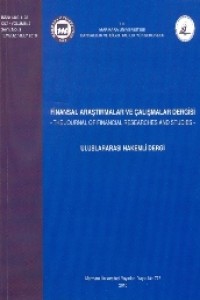Abstract
Although the current account imbalances within the Euro Area are significant, they did not draw enough attention until the debt problems of some Euro Area countries surfaced as a result of the global financial collapse in 2008. This study descriptively relates the current account imbalances within the Euro Area to the productivity disparities between the member states. Some countries geographically located in the South of the Euro Areaseem to lag behind others in increasing their productivities.This study stresses the importance of this fact as an underlying cause of the current account imbalances within the Euro Area.
References
- BUSSIERE, Matthieu, FRATSCHER, Marcel and MULLER, J. Gernot (2005), “Productivity Shocks, Budget Deficits and the Current Account”, European Central Bank Working Paper Series No. 509.
- CAIN, Donneil (2009), “The Productivity-Wage Gap and the Current Account Balance: An Empirical Analysis”, 41st Annual Monetary Studies Conference: Building Financial Sector Resilience in the Caribbean.
- CHAKRABORTY, Suparna and DECKLE, Robert (2008), “Can International Productivity Differences Explain U.S. Current Account Deficits?”,IEPR Working Paper 08.04.
- DEVEREUX,Michael B. and LAHIRI, Amartya (2006), “Global Current Account Adjustments: A Decomposition,” 2006 Meeting Papers 750, Society for Economic Dynamics.
- FELDSTEIN, Martin (2011), “Weaker Euro Will Help Solve Europe Deficit Woes”, http://www. nber.org/feldstein/ft121911.html (24.03.2013).
- FINANCIAL TIMES (2013), “Cyprus Targets Big Depositors in Bank Plan”, Europe Edition 21.March.2013, http://www.ft.com/intl/cms/s/0/5adf82bc-9201-11e2-851f-00144feabdc0 .html# axzz2P7nFbGde (22.03.2013).
- KOLLMAN, Robert (1998), “US Trade Balance Dynamics: the Role of FiscalPolicy and Productivity Shocks and of Financial Market Linkages”, Journal of International Money and Finance, 17, p. 637-669.
- LANE, Philip and PELS, Barbara (2012), “Current Account Imbalances in Europe”, IIIS Discussion Paper No.397.
- LUND, Susan and ROXBURGH, Charles (2009), “Imbalances that Strain the Eurozone”, Businessweek 18.November.2009 Issue, http://www.businessweek.com/globalbiz/ content/nov2009/ gb20091118_329053.htm (21.03.2013).
- PETTINGER, Tejvan (2012), “Will the Euro Breakup?”, Posted on 30.April.2013, http://www. economicshelp.org/blog/5223/economics/will-the-eurozone-breakup/ (20.March.2013).
- SCHODER, Christian, PROANO, R. Christian and SEMMLER Willi (2011), “The Euro and the Sustainability of Current Account Imbalances”, http://www.economonitor.com/blog/2011 /08/theeuro-and-the-sustainability-of-current-account-imbalances/ (24.03.2013).
- THE ECONOMIST (2013), “Sad Cyprus”, http://www.economist.com/blogs/buttonwood/2013/03/ euro-zone-crisis. (14.03.2013).
- ZEMANEK, Holger, BELKE, Ansgar and SCHNABL, Gunther (2009), “Current Account Imbalances and StructuralAdjustment in the Euro Area:How to Rebalance Competitiveness”,IZA Policy Paper No. 7.
Abstract
Euro Alanı’nda cari hesap dengesizlikleri büyük olsa da,2008 yılında küresel finansal çöküşün
bir sonucu olarak bazı Euro Alanı ülkelerinde borç sorunlarının ortaya çıkmasına değin yeterince
ilgi çekmemişlerdir. Bu çalışma betimsel olarak Euro Alanı’ndaki cari hesap dengesizliklerini Euro
Alanı’ndaki üretkenlik farklılıkları ile ilişkilendirmektedir. Euro Alanı’nın coğrafi konum itibariyle
güneyinde yerleşmiş bulunan bazı ülkeler üretkenliklerini arttırma noktasında diğerlerinin gerisinde
kalmış görünmektedir.Bu çalışma söz konusu gerçeğin Euro Alanı’ndaki cari hesap dengesizliklerinin
altında yatan bir neden olarak önemine vurgu yapmaktadır.
References
- BUSSIERE, Matthieu, FRATSCHER, Marcel and MULLER, J. Gernot (2005), “Productivity Shocks, Budget Deficits and the Current Account”, European Central Bank Working Paper Series No. 509.
- CAIN, Donneil (2009), “The Productivity-Wage Gap and the Current Account Balance: An Empirical Analysis”, 41st Annual Monetary Studies Conference: Building Financial Sector Resilience in the Caribbean.
- CHAKRABORTY, Suparna and DECKLE, Robert (2008), “Can International Productivity Differences Explain U.S. Current Account Deficits?”,IEPR Working Paper 08.04.
- DEVEREUX,Michael B. and LAHIRI, Amartya (2006), “Global Current Account Adjustments: A Decomposition,” 2006 Meeting Papers 750, Society for Economic Dynamics.
- FELDSTEIN, Martin (2011), “Weaker Euro Will Help Solve Europe Deficit Woes”, http://www. nber.org/feldstein/ft121911.html (24.03.2013).
- FINANCIAL TIMES (2013), “Cyprus Targets Big Depositors in Bank Plan”, Europe Edition 21.March.2013, http://www.ft.com/intl/cms/s/0/5adf82bc-9201-11e2-851f-00144feabdc0 .html# axzz2P7nFbGde (22.03.2013).
- KOLLMAN, Robert (1998), “US Trade Balance Dynamics: the Role of FiscalPolicy and Productivity Shocks and of Financial Market Linkages”, Journal of International Money and Finance, 17, p. 637-669.
- LANE, Philip and PELS, Barbara (2012), “Current Account Imbalances in Europe”, IIIS Discussion Paper No.397.
- LUND, Susan and ROXBURGH, Charles (2009), “Imbalances that Strain the Eurozone”, Businessweek 18.November.2009 Issue, http://www.businessweek.com/globalbiz/ content/nov2009/ gb20091118_329053.htm (21.03.2013).
- PETTINGER, Tejvan (2012), “Will the Euro Breakup?”, Posted on 30.April.2013, http://www. economicshelp.org/blog/5223/economics/will-the-eurozone-breakup/ (20.March.2013).
- SCHODER, Christian, PROANO, R. Christian and SEMMLER Willi (2011), “The Euro and the Sustainability of Current Account Imbalances”, http://www.economonitor.com/blog/2011 /08/theeuro-and-the-sustainability-of-current-account-imbalances/ (24.03.2013).
- THE ECONOMIST (2013), “Sad Cyprus”, http://www.economist.com/blogs/buttonwood/2013/03/ euro-zone-crisis. (14.03.2013).
- ZEMANEK, Holger, BELKE, Ansgar and SCHNABL, Gunther (2009), “Current Account Imbalances and StructuralAdjustment in the Euro Area:How to Rebalance Competitiveness”,IZA Policy Paper No. 7.
Details
| Primary Language | Turkish |
|---|---|
| Journal Section | Makaleler |
| Authors | |
| Publication Date | February 4, 2014 |
| Submission Date | February 4, 2014 |
| Published in Issue | Year 2013 Volume: 4 Issue: 8 |


